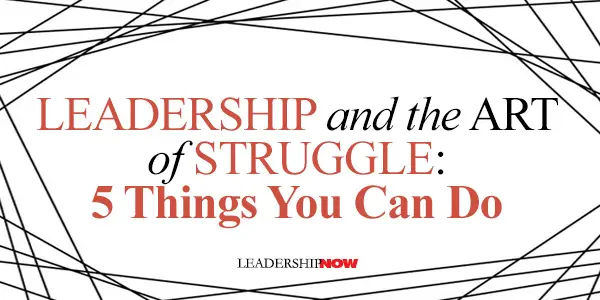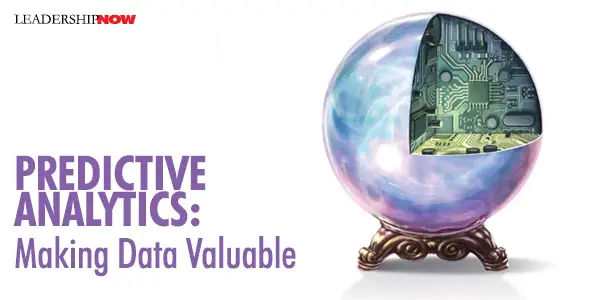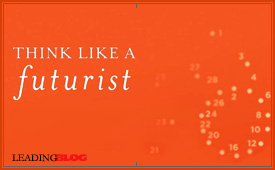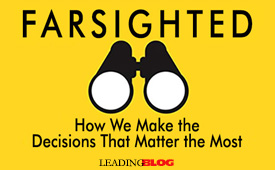 Leading Blog | Posts by Month |
 Leading Blog | Posts by Month |
03.31.13

LeadershipNow 140: March 2013 Compilation
See more on
Posted by Michael McKinney at 03:36 PM
03.29.13

Six Ways to See the World through New Lenses—and Lead More Effectively How we see the world—our leadership perspective—shapes our thoughts, decisions, and actions. That perspective is based on the sum total of our knowledge, experiences, and choices up till now. It represents the way we view ourselves and situations, how we judge the relative importance of things, and how we establish a meaningful relationship with others and everything around us. Lots of leaders are smart, but few are wise. Smart leaders view the world through lenses that skew or limit their perspective, affecting their decisions and actions. Some focus on short-term goals and on deepening their depth of knowledge in their domain of interest. Others have a long-term vision that enables them to differentiate various patterns and see how these will help them succeed. Both perspectives are limiting. When they remove those lenses, smart leaders gain a broader perspective, which gives them the opportunity to become wise. By changing their "smart" perspective and cultivating practical wisdom instead, they can lay the foundation for a wise leadership style that's more effective. With the wise leader perspective, one is able to continually reframe and reinterpret events through integration and find new meanings within a rapidly changing context. Guided by a noble purpose, wise leaders cultivate a flexible and resilient mindset that helps them act and lead with wisdom--and become more influential leaders. To move from a smart leader perspective to a wise leader perspective, start by seeing the world through new lenses. Here are six ways to do it:
Prasad Kaipa and Navi Radjou are coauthors of From Smart to Wise: Acting and Leading with Wisdom. Kaipa is a CEO advisor and coach and a senior fellow at the Indian School of Business. Radjou is an independent strategy consultant and author of the NYT bestseller Jugaad Innovation. Both based in Silicon Valley, they write popular blogs for HBR.com, speak and consult internationally, have been featured prominently in the national business media, and are esteemed thought leaders in the field of leadership development and innovation. Learn more at www.fromsmarttowise.com. 
Posted by Michael McKinney at 08:02 AM
03.27.13

5 Leadership Lessons: Avoiding the "Mediocre Me" Mindset Act boldly in shaping outcomes in our spheres of influence. Become the best version of yourself possible by exercising the creativity of thought, diversity of perspective, and depth of conviction to do what we can, when we can, where we can to try and make our part of the world a little better tomorrow than we found it today. 
Posted by Michael McKinney at 11:12 PM
03.20.13

Tipping Sacred Cows or How We Unwittingly Turn Our Virtues Into VicesTipping Sacred Cows by Jake Breeden is one of those bring-you-back-to-reality must-read books. It is about how we undermine ourselves and our organizations and get ourselves into comfortable ruts, by blindly following seemingly virtuous traits. It’s often about taking our strengths too far or misapplying them.Our values give us life and direction on one hand, “and on the other hand can steal our energy, effectiveness, and success. Like rocks in a river channel, these unexamined values can get in our way, impede our efforts, and even capsize us,” writes Breeden. Julian was given the reins of a company and immediately set about cutting waste and inefficiency—his core value. Profits temporarily rose but growth eventually stalled. He took the firm “from growing inefficiently to shrinking efficiently.” In an effort to be efficient, he ripped the heart out of the organizational culture. Breeden advises: Julian Fletcher shouldn’t stop being efficient—he needs to start being more sophisticated. He needs to raise his game so he understands how efficiency can harmonize with other complementary leadership traits he needs to nourish.Breeden tackles seven sacred cows: Balance: “Balance operates through a constant stream of choices.” Balance is often thought to mean finding the middle ground. That’s not balance, that’s compromise. In order to find the middle ground, our choices “can too easily drift toward the middle in a cowardly compromise of nothingness. Balance backfires when it moves from being about bold, sometimes tough, choices to being about bland compromises.” Collaboration: Collaboration should be accountable not automatic. “The default state of working should be alone; leaders should collaborate only when they must. Depending on your role, that may mean a significant part of your job requires collaboration. But ask yourself the question: does this work really need more than me? Creativity: We all like creativity. It’s fun and exciting. But creativity needs to be useful and meet a real need or it’s just narcissistic creativity—creativity to serve our legacy. “Creativity should be pragmatic, not prideful.” Excellence: Our pursuit of excellence “backfires when our high standards choke progress.” Forcing excellence on the process rather than the outcome. One point I would add to Breeden’s section on excellence: excellence isn’t about doing everything perfectly. That’s perfectionism. We need to be careful not to confuse the two. Excellence is a way of thinking and includes making excellent mistakes, learning an excellent lesson and perhaps even going on to make a new and different mistake. If excellence is used as an excuse for indecision, avoiding all risk or unreasonable and immovable standards, it’s counterproductive. Excellence is a term that we sometimes throw around too loosely. It’s an excuse to cover perfectionism and/or controlling and self-centered behavior—my way or the highway. Fairness: “Fairness backfires when some of our noblest instincts force us to ensure equitable outcomes rather than equitable processes.” Keeping score and evening the score to make sure no one gets more than their "fair share" often leads to regrets. Passion: Bad passion crowds out everything else causing you to ruminate on one thing at the expense of others. Healthy passion is part of a diverse set of traits. Passion backfires when it becomes obsessive. Preparation: The problem here is with too much backstage preparation. Preparation is critical but sometimes the best work is done in real-time—onstage preparation—learning while you are doing. To make all of this very practical, Breeden provides in each chapter seven steps to: Make Your Balance Bold, Make Your Collaboration Accountable, Make Your Creativity Useful, Make Your Excellence Meaningful, Train Your Brain to Focus on Process Fairness, Make Your Passion More Harmonious, and seven ideas to Take Your Preparation to Center Stage. Very helpful material. “Sometimes, without realizing it, we use our most reassured values as an excuse to avoid the discomfort of actually leading.” Organizational cultures and personal assumptions promote certain values. If these values are not examined from time to time in light of the overall purpose, then they can cause derailment or stagnation. We can train ourselves “to avoid the waste that comes from the unintended consequences of unexamined conventional wisdom.” We can learn to lead with wisdom.

Posted by Michael McKinney at 07:54 PM
03.18.13

Fred 2.0 – Leadership in ActionYou are no doubt familiar with Fred, first introduced to us in The Fred Factor by Mark Sanborn. Fred exemplified an attitude of exceptional service delivered consistently with creativity and passion in a way that values other people.Now Fred 2.0 brings us fresh insights, deeper understanding and wider application of the Fred Principles—and an update on the life of the real Fred Shea. Fred 2.0 is about a specific way of approaching life and business. It’s an attitude that extends far beyond customer service. It comes from within and says I will do extraordinary things because that’s who I am. It’s not a feeling—it’s who you are. It is not dependent on the performance of anyone else. Why Would You Live this Way? Sanborn says it’s because being a Fred enriches others, expands you, puts more life into your living, breaks the bonds of self-absorption, makes you more employable, offers you a better way to live, creates a positive influence, and is more fun. “Creativity is an essential ingredient in delivering extraordinary results,” writes Sanborn. Being creative is doing something different that adds value. More often than not, it’s the little things we notice that can be done better. This applies not only to the “things” we do, but also to our relationships; how we respond and interact to those around us. Sanborn shows very specifically how to build better relationships, elevate the experience for those we come into contact with, how to build a team of Freds and how to instill the Fred approach in your kids philosophy of life. The Fred Philosophy is Good Leadership The Fred philosophy is ultimately what good leadership is all about. It’s a battle against mediocrity says Sanborn. The first job of leadership is to help people see their significance. Leaders recognize that those who feel insignificant rarely make significant contributions. An effective leader is able to show people that they are significant in ways they may not realize.The Fred philosophy means: • Leading by example • Starting with what’s right instead of what’s wrong • Encouraging people to try • Asking for and sharing good ideas • Removing barriers and obstacles • Being a champion of those around you • Giving people the freedom they need • Teaching the Fred philosophy consistently • Recognizing and rewarding • Make the process enjoyable “It’s our choice whether we’ll use our time, effort, and talents to turn ordinary work into something extraordinary.” writes Sanborn. It begins as always, with integrity. If you value it, those around you will too. Fred 2.0 will show you the thinking behind extraordinary leadership and apply it in every area of your life. “When you know what is important to you in your life and work, you should apportion your talents and efforts so you can give the best you have to those things.” Love what you do and love the people you do it with.
SPECIAL OFFER: Visit Mark Sanborn's Fred 2.0 web site now to learn more and gain instant access to a Fred 2.0 “EXTRAordinary Results” Resource Kit, free with purchase of Fred 2.0. 
Posted by Michael McKinney at 05:17 PM
03.14.13

quickpoint: Learning to Lead Emerging leader, Jonathan Doochin, learned from an early age the importance of reflection and optimism, the impact of mentorship, and the potential of thinking like an entrepreneur. In a book by and about emerging leaders, Passion & Purpose, he shares this on leadership: Emerging leader, Jonathan Doochin, learned from an early age the importance of reflection and optimism, the impact of mentorship, and the potential of thinking like an entrepreneur. In a book by and about emerging leaders, Passion & Purpose, he shares this on leadership:
Each of us has the capacity to lead. Each of us, likely, has also shied away from leadership at times. We’ve been told we simply don’t have what it takes—the intelligence, the charisma, the genetics—and, too often, we’ve listened. Increasingly, however, there is more awareness among young people that all of the mysterious qualities that once defined “leadership” are not inherent, but eminently teachable. And a generation defined by increasing interconnectedness and diversity understands better than previous generations that although there are universal principles of leadership, the model for leadership is not one-size-fits-all, but should be individualized as we play to our own strengths and personalities. 
Posted by Michael McKinney at 12:01 AM
03.12.13

Leadership and the Art of Struggle: 5 Things You Can Do
STRUGGLE is a part of any human endeavor and leadership is no different. The problem is we view struggle as a negative. But struggle is how we grow. Without them we can’t reach our full potential as leaders. We like to think of our leaders as flawless. We like to be perceived as flawless—or at least we like people to think we have everything under control. But as Joe Badaracco has pointed out, “leadership is a struggle by flawed human beings to make some important human values real and effective in the world as it is.”It may sound counterintuitive, but considering the benefits illuminated by Stephen Snyder in Leadership and the Art of Struggle, we should welcome it as an important element of the leadership process and our own personal development. Snyder writes that we should face struggle “head on—not hiding from it or feeling shame—because struggle is the gateway to learning and growth.” It can also help us to discover our purpose and meaning and develop the adaptive energy necessary to sustain our leadership for a lifetime. Struggles have three defining characteristics:
In the world we live in today, this is a common occurrence often leading to burnout unless we learn to see struggle through a different lens. Snyder recommends: Adopt a growth mindset. The first step in accomplishing this is through reflection—being aware of what is going on around you. Snyder’s former colleague at Microsoft, Frank Gaudette, used to say: “I reserve the right to wake up smarter every day.” A good mantra to make our own. Center your mind, body and spirit. We all need some way to anchor ourselves and gain perspective that we practice daily like exercise and diet, prayer, connecting with nature, meditation, and/or journaling. Build your support community. “Create a community of people whom you can connect and bond with and from whom you can seek advice and feedback.” Overcome your blind spots. Blind spots by their very nature are hard to recognize. And they are frustrating because they blind us from seeing why people may be responding to us in counterproductive ways—leading us to finger pointing rather than personal responsibility. “Blind spots,” writes Snyder, “are the product of an overactive automatic mind and an underactive reflective mind.” A fairly common blind spot Snyder calls the Conflict Blind Spot. This blind spot can cause someone to interpret every interaction through a distorted lens. It reinforces the perception that the other person is wrong and we are right. Recommit, pivot, or leap. When we struggle we have essentially three options. The first is to recommit and stay the course. The second is to pivot and make a course correction. And third is to leap into uncharted territory far beyond our comfort zone. Choosing the right option requires that we examine ourselves and determine which choice is most consistent with our personal values or mission statement. Every struggle is a chance to learn and to confront who we are and what we are becoming. Seen in that light, they are a gift. And our ability to deal with our own struggles effectively has an impact on those around us. Not only does it create a more positive environment to function in, but it provides a constructive example for others to follow. Snyder has written an outstanding and practical book to help us to rethink the challenges and problems we face along the way. One of the best you’ll ever read on the topic. (The Adaptive Leader Profile is available from Snyder Leadership Group.)

Posted by Michael McKinney at 10:27 PM
03.07.13

Predictive Analytics: Making Data Valuable
THOMAS DAVENPORT says that we live in a predictive society. Black Swans notwithstanding, most human behavior is quite regular and predictable. It perhaps goes without saying that organizations secure a competitive stronghold by predicting the future destiny and value of individual assets. Prediction though, is easier said than done. It involves a complex mix of data, all weighed in varying degrees. However, predictions need not be “accurate” to score big value, says Eric Siegel in Predictive Analytics. For example: One of the most straightforward commercial applications of predictive technology is deciding whom to target when a company sends direct mail. If the learning process identifies a carefully defined group of customers who are predicted to be, say, three time more likely than average to respond positively to the mail, the company profits big time by preemptively removing nonresponders from the mailing list. And those nonresponders in turn benefit, contending with less junk mail. Data, while often considered eminently boring, “embodies a priceless collection of experience from which to learn.” It’s a way to leverage what you know—where you’ve been. This mind-numbing work can be done—and is done—almost automatically by computer. With computers we are able to discover new patterns and develop new knowledge by processing huge amounts of data—almost automatically. “Machine learning,” as it is called, “develops predictive capabilities with a form of number-crunching, a trial-and-error learning process that builds upon statistics and computer science.” Interestingly, Siegel writes, “the machine actually leans more about your next likely action by studying others than by studying you.” Prediction empowers the organization with an entirely new form of competitive armament. “Predictive Analytics is the process by which an organization learns from the experience it has collectively gained across its team members and computer systems. In fact, an organization that doesn’t leverage its data in this way is like a person with a photographic memory who never bothers to think.” “Predictions drive how organizations treat and serve an individual, across the operations that define a functional society.” How can we use this emerging science to use data-driven predictions to improve the effectiveness of business and the quality of our lives?   
Posted by Michael McKinney at 11:53 PM
03.01.13

First Look: Leadership Books for March 2013Here's a look at some of the best leadership books to be released in March.




For bulk orders call 1-800-423-8273  Build your leadership library with these specials on over 120 titles. All titles are at least 40% off the list price and are available only in limited quantities.
Posted by Michael McKinney at 07:19 AM
|
BUILD YOUR KNOWLEDGE


How to Do Your Start-Up Right STRAIGHT TALK FOR START-UPS 
Grow Your Leadership Skills NEW AND UPCOMING LEADERSHIP BOOKS 
Leadership Minute BITE-SIZE CONCEPTS YOU CAN CHEW ON 
Classic Leadership Books BOOKS TO READ BEFORE YOU LEAD |
|